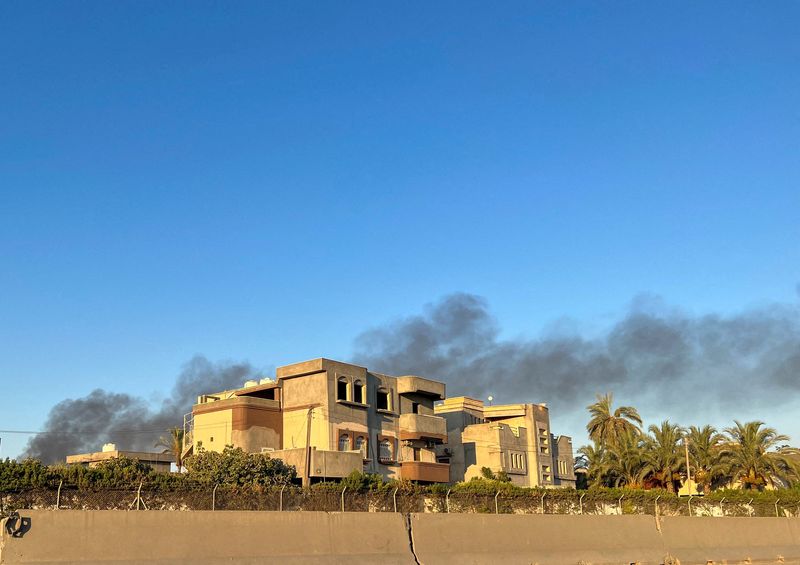Reports of dead in Libya as clashes strike capital
2022.07.22 11:38

Smoke rises in the sky following clashes in Tripoli, Libya July 22, 2022. REUTERS/Ayman al-Sahili
TRIPOLI (Reuters) – Intense clashes erupted between rival factions in Libya early on Friday with reports of several people killed amid growing concern that a political standoff could prompt renewed conflict.
A Reuters journalist saw clashes in the central district near the Radisson Blu hotel, an area where several government and international agencies and diplomatic missions are based, as well as military vehicles mobilised around Zawiyat Dahmani.
Witnesses also said there was fighting in the Asbaa area and in Ain Zara. Tripoli residents said a man and a child had been killed. Local news reports, citing medical sources, later said that five people had been killed.
Libya has been teetering on the edge of chaos for months after the eastern-based parliament rejected the unity government in Tripoli, which was installed through a U.N.-backed process last year, and appointed a rival administration.
Both prime ministers have support from among the armed factions that control territory in the capital and other western Libyan cities.
The parliament-appointed prime minister, Fathi Bashagha, has been unable to move into Tripoli because groups in the capital backing the Government of National Unity (GNU) there and its prime minister, Abdulhamid al-Dbeibah, have prevented his entry.
Over recent weeks, political shifts have pointed to a possible realignment among power brokers and armed factions that could prompt renewed fighting.
PROTESTS
The biggest protests for years occurred earlier this month in cities across Libya controlled by rival factions, underscoring popular anger over the lack of elections and poor state services.
Afterwards, factions in several cities detained people suspected of involvement, prompting the U.N. Libya mission to express concern on Thursday.
A blockade of oil output by groups aligned with eastern commander Khalifa Haftar had meanwhile cut off funding to Dbeibah’s government.
But last week Dbeibah appointed a new state oil company chief, said to be an ally of Haftar, leading to a swift end of the blockade.
That prompted reports of a deal between Haftar and Dbeibah to keep him in power. This week saw a first visit to Tripoli by a senior officer from Haftar’s Libyan National Army (LNA) as part of scheduled talks to maintain a 2020 ceasefire.
Western Libyan armed factions battled Haftar during his assault on the capital from 2019-20 and refuse to accept him having influence in Tripoli – something that previously counted against Bashagha but may now also be a problem for Dbeibah.
This week Bashagha visited the key western city of Misrata – the hometown of both him and Dbeibah – for the first time since his appointment by parliament. The move led to mobilisations in the city both by groups backing and opposing him.








